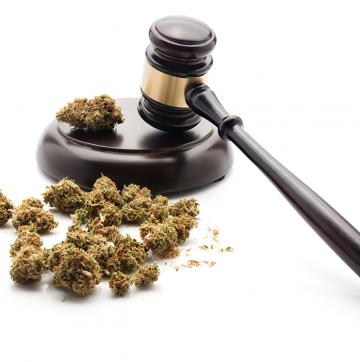
Social equity programs have created 240,000 jobs for individuals throughout the U.S., and accumulated about $369 million in tax revenue so far, reports JD Supra.
Based on Green Entrepreneur‘s analysis, experts predict jobs and cannabis business ownerships will grow to approximately one million in the next decade.
Due to the increase of the business landscape, JD Supra reports that U.S. sales will climb as high as $30.4 billion by 2023.
Oakland designed a Cannabis Social Equity Program to address the social disparities created by the War on Drugs.
Cannabis Arrest Data
FBI crime statistics report that there is a cannabis arrest every 58 seconds in the U.S. Most of those arrested are from minority communities.
For example, despite similar usage rates, ACLU finds that Black Americans are four times more likely to be arrested than white Americans. In comparison, Black people receive more punitive sentences than whites. Additionally, there were more arrests for cannabis than for all violent crimes combined in 2018, the ACLU adds.
First-time possession offenses can result in one year in jail and up to a $1,000 fine — depending on the state. For repeated offenders, possession can lead to a stricter punishment of jail time and felony conviction.
Compared to other industries, the cannabis industry heavily highlights a more intense social responsibility. Cannabis convictions heavily influence a person’s rights. For example, they can limit them from gaining employment, housing loans and mortgages, child custody, and more.
Defining Cannabis Social Equity:
According to the City of Los Angeles, cannabis social equity programs:
“promote equitable ownership and employment opportunities in the cannabis industry in order to decrease disparities in life outcomes for marginalized communities, and to address the disproportionate impacts of the War on Drugs in those communities.”
Initiating a National Movement
A report from the Berkeley Public Policy Journal, stated that Oakland, California earned a reputation of “an innovative policy originator” because it tried to put an end to the War on Drugs.
San Francisco Chronicle reported that African Americans in Oakland accounted for the majority of cannabis arrests.
The Berkeley Public Policy report said this isn’t because of “increased use or sale of cannabis in communities of color. But [it] is instead the result of an enormous disparity in the rates of arrest.”
After California legalized medicinal cannabis in 1996, white people owned many of the small cannabis businesses. With little to no interference from police, their businesses flourished and succeeded which gave them more power.
Furthermore, up until 2017, data from Marijuana Business Daily found that 81% of canna-businesses were owned by white people, while Black and Latinx entrepreneurs accounted for 4.3% and 5.7%, respectively.
The Purpose of the Oakland’s Cannabis Social Equity Program
An open-minded Oakland City Council established the Department of Race and Equity in 2015. Their mission: build equity in the cannabis industry. The council aimed to ensure justice and eliminate any barriers that prevented people of color from participating in the industry.
In 2017, the council created Oakland’s Cannabis Social Equity Program aimed at helping non-white communities enter the cannabis industry. Oakland’s social equity program is growing the number of minority entrepreneurs who can relish in the success of the industry. The city breaks the program’s qualification into tiers, including:
Tier 1 includes an applicant who has a low income and was convicted of a cannabis offense or a resident of the “disproportionately impacted area” for five years or more. Additionally, they should own 51% of the business they are applying for.
Tier 2 states applicants must be of low income and own 33 ⅓ % of the company’s equity and are residents of the “disproportionately impacted area” for at least five to 10 years.
Tier 3 applicants need to provide “capital, leased space, business, licensing and compliance assistance,” for a total of three years, according to the program qualifications.
An Ongoing Problem: Officials are Still Locking up so Many People
According to packaging supply company, O.berk, as of 2021, only 11 states have legalized recreational cannabis use, eliminating arrests for specific cannabis possessions based on each state’s rules. This means that 39 states still establish harsh penalties for cannabis offenses since they have not legalized it, yet.
Cannabis is not federally legalized yet, demonstrating that it is still categorized as an illegal schedule I substance, putting it in the same category as heroin and ecstasy.
Unfortunately, retroactive ameliorative relief does not exist in the U.S. This means there are no federal laws that can clear a convicts’ records of a federal felony. The U.S. is one of the 22 countries worldwide that does not grant retroactive ameliorative relief. Since law enforcement detains more people of color, the lack of relief has harsher consequences on their lives. Convicts will not have the opportunity to have a fresh start, even in countries that legalized cannabis use. The damage of cannabis possession sentences has been gradually impacting people’s lives.
ACLU research report, inequality did not improve since 2010, even after the legalization of cannabis.
That is because many states still criminalize cannabis use. A a result, criminal records leave cannabis offenders in those states without opportunity.



Leave a Reply